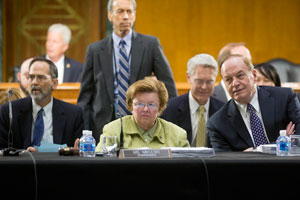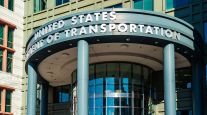Senior Reporter
Panel Adopts HOS Amendment, Advances Transportation Bill to Full Senate

WASHINGTON — Senate appropriators on June 5 adopted a proposal to study a federal safety rule that is opposed by much of the trucking and freight industry, before approving a fiscal 2015 transportation spending bill.
The Appropriations Committee voted 21-9 to adopt an amendment offered by Sen. Susan Collins (R-Maine), that would suspend the Federal Motor Carrier Safety Administration’s hours-of-service restart rule while the agency conducts a one-year study to examine the rule.
SHARE YOUR REACTION: Tell us on Facebook
In calling on colleagues to back her proposal, Collins said the agency’s rule had resulted in “unintended consequences” that affected the trucking industry.
Sen. Mary Landrieu (D-La.), backed Collins’ amendment, noting that she gets a “visceral reaction” when the federal government tells truckers when they can sleep.
FMCSA’s restart rule requires truck drivers who reach a maximum of 70 hours of driving within a week to rest for 34 consecutive hours in order to resume their shifts. The rest time must include at least two periods from 1 a.m. to 5 a.m.
American Trucking Associations’ leadership had called on senators to support Collins’ amendment, stressing the restart rules have presented “economic hardships on countless employers and reduced drivers’ wages” throughout the industry.
“Since these rules were proposed in 2010, ATA has maintained that they were unsupported by science, and since they were implemented in 2013, the industry and economy have experienced substantial negative effects as a result,” ATA President Bill Graves said.
Collins’ amendment drew fierce opposition from key Democrats, who argued that FMCSA’s rules to limit the time truckers spend on the road improve highway safety.
Full committee Chairwoman Barbara Mikulski (D-Md.), who opposed the amendment, argued that FMCSA’s rule has helped reduce driver fatigue.
The House, meanwhile, is scheduled to debate its fiscal 2015 transportation spending bill on the floor June 9. Its legislation would direct FMCSA to offer Congress scientific evidence supporting the benefits of the agency’s once-per-week restart restriction. The agency’s study would need to be submitted within 90 days of the bill’s enactment.
FMCSA Administrator Anne Ferro has continued to claim the restart rule that took effect July 1 has been instrumental in enhancing safety. On June 3, she blogged on the Department of Transportation’s website that “suspending the current hours-of-service safety rules will expose families and drivers to greater risk every time they're on the road.”
Overall, the Senate’s fiscal 2015 Transportation and Housing and Urban Development appropriations legislation, reported to the floor by a vote of 29-1, exceeds the Obama administration’s request of $51 million and the fiscal 2014 enacted level of $50.8 billion. Sen. Mike Johanns (R-Neb.) voted against the bill, which advances to the floor, where it could be debated the week of June 16, Senate leaders indicated.
Bill sponsors praised their measure but noted it lacked a funding solution for the rapidly depleting federal Highway Trust Fund account.
The bill would provide $40.3 billion for federal-aid highway programs that would be contingent on a funding system that would have to be authorized by Senate tax and policy writers. Sen. Patty Murray (D-Wash.) said she is hopeful Congress will not let the fund become insolvent.
According to DOT’s projections, the trust fund will run out of money as early as late July. House and Senate transportation leaders have yet to agree on a funding system to avoid a shortfall. A proposal by House GOP leaders to rely on savings from U.S. mail delivery cutbacks to boost the trust fund has run into heavy opposition.
The Senate bill would provide $550 million next year to the popular Transportation Investment Generating Economic Recovery, or TIGER, grant program. While that sum is slightly less than this year's total of $600 million, it is far above the $100 million in the House version. The administration is requesting $1.25 billion for the program in fiscal 2015.
The bill also would direct the Pipelines and Hazardous Materials Safety Administration to finalize regulatory action to change existing tank car design standards. It would provide $834 million for the National Highway Transportation Safety Agency, $150 million for the Washington Metropolitan Area Transit Authority and $104 million for the National Transportation Safety Board.
Moreover, the bill calls on the Federal Highway Administration to encourage state departments of transportation to use cost-benefit analyses when selecting highway projects.
“The bill continues our investments in roads and bridges, railroads, public transit systems and airports, and makes critical investments to protect the safety of crude oil shipments,” Murray said.




